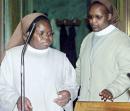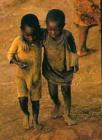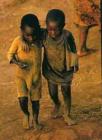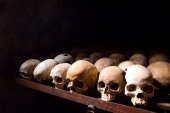She was 17 years
drinking the water from the rain cupped in her hands
it wasn't mixed with the blood on her land
unlike her tears
Joseline Joseline
No more a child
For 2 months she lived on the run
they were checking noses ears and fingers to see if she was one
death all the while
Joseline Joseline
Joseline when she came home
no one left, she was all alone
she had watched from the hills the grizzly ballet
performed by faces she'd known all her days
Now she's 25
carrying three little children round and round
searching out those who still hear the sounds
still alive
Joseline Joseline
a woman now
not allowed to earn money or to go to school
now that everyone's dead she breaks that rule
tell me how
Joseline Joseline
Joseline what do you say
when people look at you a certain way
and all the little girls follow here and there
with eyes so wide and souls so bare
drinking the water from the rain cupped in her hands
it wasn't mixed with the blood on her land
unlike her tears
Joseline Joseline
No more a child
For 2 months she lived on the run
they were checking noses ears and fingers to see if she was one
death all the while
Joseline Joseline
Joseline when she came home
no one left, she was all alone
she had watched from the hills the grizzly ballet
performed by faces she'd known all her days
Now she's 25
carrying three little children round and round
searching out those who still hear the sounds
still alive
Joseline Joseline
a woman now
not allowed to earn money or to go to school
now that everyone's dead she breaks that rule
tell me how
Joseline Joseline
Joseline what do you say
when people look at you a certain way
and all the little girls follow here and there
with eyes so wide and souls so bare
Contributed by CCG/AWS Staff - 2007/9/17 - 22:27
×
![]()
Note for non-Italian users: Sorry, though the interface of this website is translated into English, most commentaries and biographies are in Italian and/or in other languages like French, German, Spanish, Russian etc.






© 2004 Tom Flannery and Lorne Clarke
a SongaWeek.com production
www.rwandasongs.com
Clarke & Flannery love to hear your thoughts on the song cycle. Email them to anthracite@rocketmail.com.
Truth is, there is no explanation for the Rwandan genocide. What there is in abundance, however, is ignorance. If these songs make just one person dig a little deeper, then we've made our money back, so to speak. We've touched upon specific pieces of the horror, but don't even pretend to be able to understand it from the Rwandan point of view. We're observers from afar. Interested, heartbroken observers....but merely observers nonetheless. Please keep that in mind.
All of these songs are solo acoustic performances...recorded live with a digital 8 track studio in Northeastern Pennsylvania. The full lyrics are available, as are the complete recordings in both mp3 and quicktime formats. Notes for each song are provided, giving some insight into the creative process....and explaining where explanations are necessary. The entire project is only available via the internet. There is no "official" CD of this music. This is strictly an "online" project.
This is partly due to economics, but also because once a CD is released, it can't be changed. We're likely to add new songs here at any time.
Individual essays are also posted, because some ideas that we have probably can't be conveyed using the song form alone. These too will probably grow in time. Also, a brand new play by playwright Tom Flannery called Rwandan Eyes is available exclusively here.
Everything here is free. Listen, distribute freely, discuss.
Do everything but steal.
Tom Flannery & Lorne Clarke.
ABOUT THE SONG
She hid out in the tall grass outside her village with her twin sister for a few days, but had to move further away from home when the killers set fire to the fields. She was careful to avoid the roads because she remembered that "the Hutus would stop you to look at your fingers, your nose and ears to see if you were Tutsi."
For 2 months Joseline lived on rain water and food scavenged from gardens that were frequently filled with corpses. When the Tutsi-led Rwandan Patriotic Front swept into the country and stopped the killing she found her way back home. "There was no one left", she says. She could climb the hill and point out a mud structure in the midst of an overgrown field. "That was my home," she said, "where my parents and my brothers and sisters were all killed."
In 2003 she turned 25...with children of her own. Four years previously she was elected as her town's head of development...this in a country previously so dominated by men that a woman wasn't allowed to milk a cow.
She is now responsible for the reconstruction of Butamwe's shattered infrastructure, as well as its health services and systems of justice, education, culture, and economy. She is rebuilding for others....while at the same time desperately trying to put herself back together. A remarkable woman who deserves much more than a song.